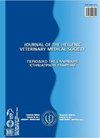Effects of Beta Vinasse Supplementation on Performance, Meat Quality and Ilio- Caecal Microflora in Quail Rations
IF 0.4
4区 农林科学
Q4 VETERINARY SCIENCES
引用次数: 0
Abstract
The aim of this study was to evaluate the effects of β-vinasse supplementation on the live weight (LW), live weight gain (LWG), feed intake (FI), feed conversion ratio (FCR), carcass yield, meat quality and ilio-caecal bacteriological flora of quails. A total of 240 5-d-old Japanese (Coturnix coturnix Japonica) quails, including both males and females, were divided into 3 groups 80 quails and treated as follow: a control group with 0 g β-vinasse/kg ration; (2) 15 g/kg β-vinasse and (3) 30 g/kg β-vinasse. The study lasted for 6 weeks. At the end of the experiment, suplementation with β-vinasse did not have significant effect on FI and FCR. Dietary supplementation with 30 g/kg β-vinasse significantly (P < 0.05) increased LW (21 d) and LWG (5 to 21 d). The dietary treatment of quails with different levels of β- vinasse did not effect on hot carcass weight, cold carcass weights, hot and cold carcass yields and breast and thigh pH. The lightness (L*) and yellowness (b*) of breast values were significantly (P<0.05) increased of 30 g/kg supplementation. Different levels of β-vinasse significantly increased Lactobacillus spp. in faeces. As a result, it was concluded that β-vinasse (by-product obtained from molasses) can be used in quail diets as an alternative feed source that will meet the nutritional needs of the animal and have positive effects on the digestive system, especially on the intestinal health ( an increase in Lactobacillus spp. counts).添加β-葡萄糖苷酶对鹌鹑生产性能、肉品质及盲肠菌群的影响
本研究旨在评估添加β-醋液对鹌鹑活重(LW)、增重(LWG)、采食量(FI)、饲料转化率(FCR)、胴体产量、肉质和髂盲肠细菌区系的影响。将240只5日龄日本(Coturnix Coturnix Japonica)鹌鹑(包括雄性和雌性)分为3组,每组80只,处理如下:对照组,0 gβ-醋液/kg日粮;(2) 15克/公斤β-酒糟和(3)30克/公斤。研究持续了6周。在实验结束时,用β-vinasse补充对FI和FCR没有显著影响。日粮中添加30g/kg的β-酒糟可显著提高LW(21d)和LWG(5-21d)(P<0.05)。日粮中添加不同水平的β-醋液对鹌鹑的热胴体重、冷胴体重、冷热胴体产量以及胸脯和大腿pH值没有影响。添加30g/kg后,鹌鹑胸脯的亮度(L*)和黄度(b*)显著增加(P<0.05)。不同水平的β-葡萄汁显著增加了粪便中的乳酸杆菌。因此,得出的结论是,β-醋汁(从糖蜜中获得的副产品)可以作为一种替代饲料来源用于鹌鹑日粮,它将满足动物的营养需求,并对消化系统,特别是肠道健康产生积极影响(乳酸杆菌计数增加)。
本文章由计算机程序翻译,如有差异,请以英文原文为准。
求助全文
约1分钟内获得全文
求助全文
来源期刊

Journal of the Hellenic Veterinary Medical Society
VETERINARY SCIENCES-
CiteScore
0.60
自引率
0.00%
发文量
83
审稿时长
>12 weeks
期刊介绍:
The Journal of the Hellenic Veterinary Medical Society (J Hellenic Vet Med Soc) is a quarterly peer-reviewed journal that publishes articles in all aspects of veterinary science and related disciplines. It is published by the Hellenic Veterinary Medical Society and is indexed in the Web of Science and in Scopus.
There are no publication fees in the journal. Authors considering submitting manuscripts for evaluation and publication are requested to read carefully the instructions for authors and fully comply with them.
Non-complying manuscripts may be returned to the corresponding author for formatting.
 求助内容:
求助内容: 应助结果提醒方式:
应助结果提醒方式:


